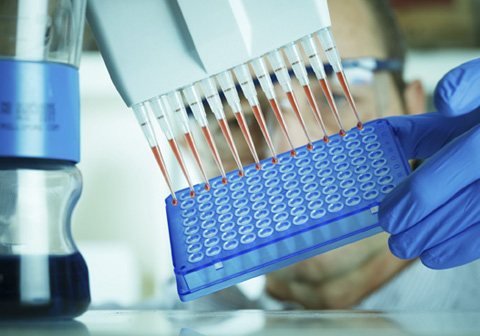The treatments used to combat childhood cancer have increased the survival rates of these children from 10% to 80%. But there are patients who suffer severe toxicity and the treatment has to be stopped or reduced, which lowers the chance of survival. The UPV/EHU's Genetics and Epigenetics for Cancer and Mental Illnesses Group is exploring genetic markers to tailor the treatment from the start and thus prevent the toxicity caused by some drugs in certain cases.
Pharmacogenetics to personalise treatment in paediatric cancer
Pharmacogenetics to personalise treatment in paediatric cancer
- Research
First publication date: 28/07/2015

One of the challenges facing current medicine is to find markers that allow the treatment to be tailored to each person, in other words, to achieve more personalised medicine. Pharmacogenetics sets out to predict which drugs will be the most effective and safest on the basis of the individual's genetic profiles. This involves analysing the genetic characteristics of the individuals. In the human genome there are parts that differ from one individual to another and these small differences affecting the genes involved in the metabolism and elimination of drugs are the ones that differentiate each person with respect to his/her response to treatment.
This is in fact the aim of one of the studies being conducted by the UPV/EHU's Genetics and Epigenetics for Cancer and Mental Illnesses Group: to look for the genetic characteristics that will indicate whether a patient is going to metabolize, better or worse, a substance used for a specific treatment to combat childhood cancer. As Africa García-Orad, the group's lead researcher explains, "we compare the genetic characteristics of the children who have been given certain drugs and who have developed toxicity with the genetic characteristics of other children who have been treated with the same drugs and who have not developed toxicity".
Towards personalised medicine
The FDA (Food and Drug Administration) recommends analysing 59 pharmacogenetic biomarkers in oncology, which means that right now 59 genetic variants can be used to establish the dose of certain drugs. For acute lymphocytic leukaemia (ALL), the main paediatric cancer in developed countries, the analysis of only one variant has been recommended so far. In a recent study, the research group found that there are other toxicity markers of some of the drugs used to treat childhood ALL which could be useful in the future but which need to be validated before they can be accepted. Right now, one-off advances have been achieved, but there is a long way to go. "Eventually this will be a reality," explained the researcher, "but not yet".
A lot of progress is being made in the study of the genetic information that is associated with drug response. "There are already drugs that are only prescribed or not prescribed when a specific type of genetic alteration is detected," concluded the researcher. More and more drugs require the use of the individual's genetic information to specify the dose."
Additional information
The UPV/EHU's Genetics and Epigenetics for Cancer and Mental Illnesses Group has three PhD holders; basic as well as clinical researchers from the Faculty of Medicine participate in it. The lead researcher is Dr Africa García-Orad Carles of the Department of Genetics, Physical Anthropology and Animal Physiology of the Faculty of Medicine and Odontology. The group's research aim is to contribute towards the knowledge about how genetics and epigenetics are involved in cancer and mental illnesses. They have various lines of research in which they study the detection of new alterations and new diagnostic tools; the genetics of lymphomas; the implications of genetics and epigenetics in the susceptibility, diagnosis, prognosis and treatment of lymphomas; and the mechanism of action of new drugs. The group also works on genetic studies relating to predisposition to disease.







